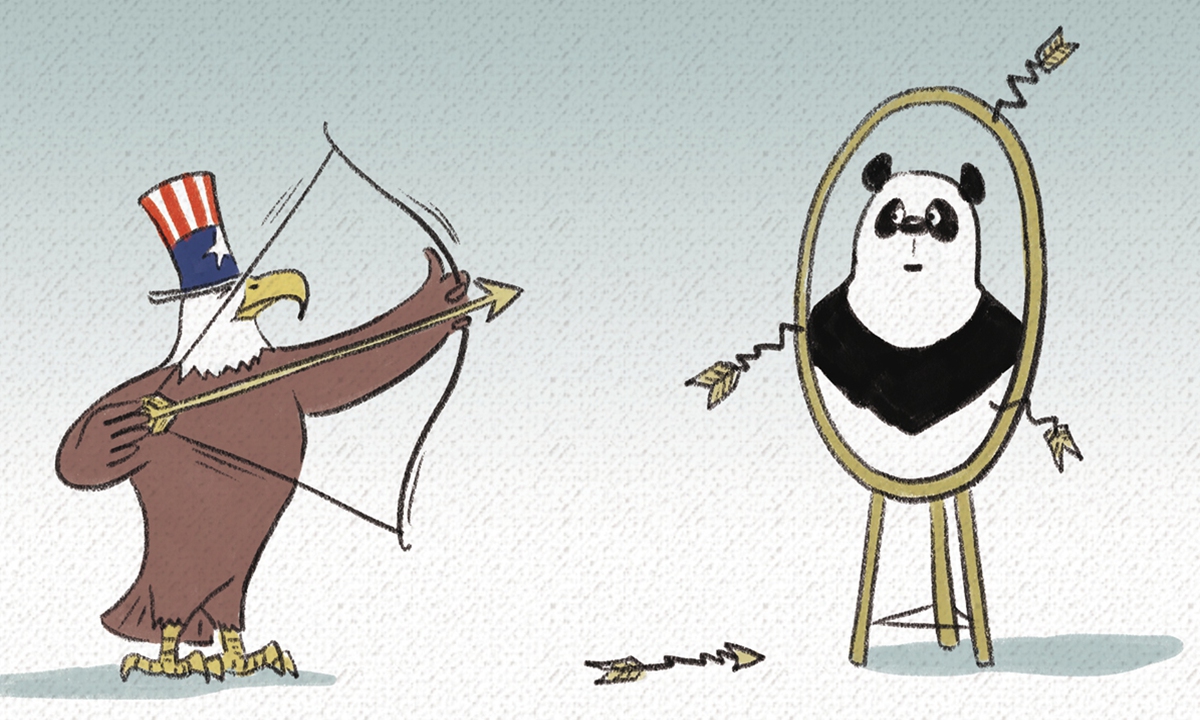US making up China threats never lacks wild excuses
By Ling Shengli Source: Global Times Published: 2020/10/27 13:33:40

Illustration: Liu Rui/GT
Recently, US National Security Advisor Robert O'Brien published an article in Foreign Affairs magazine, titled "How China Threatens American Democracy." This is just another ploy of US President Donald Trump's administration to stoke the fires of a new cold war between China and the US.
Looking back on recent years, Trump's senior officials, such as Vice President Mike Pence and Secretary of State Mike Pompeo, have accused China on many occasions of posing an ideological threat to the US. They claim China is infiltrating the US with "sharp power."
Is China really a threat to US' democracy? The US is well aware and this is just another example of the US using ideological means to suppress China. In recent years, as the power gap narrows between China and the US, the latter's hegemonic anxiety has deepened. In order to suppress China, Washington constantly exerts pressure on Beijing in the fields of politics, military affairs, economy, science and technology. It has also launched frequent ideological attacks. This has made the so-called China-US ideological competition particularly evident.
Relevant US' moves have strengthened the argument about China and the US are falling into a new cold war. Undoubtedly, ideological differences exist between the two. But this should not dominate their relationship. The ideological differences between China and the US are the result of long-term historical processes, and their respective historical choices. Washington's repeated accusations against Beijing's infiltration are groundless.
The US has accused China of utilizing sharp power. It contends that China's influence on US public opinion has increased.
Therefore, Washington has designated major Chinese media outlets as "foreign missions" to restrict what those outlets can publish in the US. It is actually using this disguise to drive Chinese media institutions and personnel out of the US. At the same time, the US also attacks the Chinese political system and the Communist Party of China (CPC), trying to separate the Party from the Chinese people.
Why does the US repeatedly emphasize China's influence on its own ideology? US' confidence in its very own system is declining. Due to domestic political polarization, the competition between the two major parties in the US has become increasingly fiercer. US people's identity politics have become stronger. This has made US' political tolerance decrease. The vehement struggle between the two major parties has become obvious to the entire world.
Internationally, the neo-liberal world order is now at risk. In the face of increasing global issues, including COVID-19 crisis, many so-called liberal democratic countries are challenged like never before. US' soft power and its institutional advantages have been greatly weakened worldwide. Both internal and external affairs have exacerbated the crisis of the US democratic system.
By comparison, China's growing strengths make US concerns even more apparent. After all, China does not base itself on US' liberal democratic system and chooses its own path. It adheres to the leadership of the CPC and its own ideology and values. This makes the US think that China has developed a "Beijing model," which may replace the "Washington model." Some US politicians and scholars tend to believe US' influence is decreasing around the world, particularly in developing countries - while "Beijing model" is advancing rapidly.
This mind-set may lead to a greater divergence in international influence between China and the US. There is a running logic in Washington that it needs to continuously make up the so-called China's threat in order to mobilize the US people as much as possible to support US' containment strategy against China.
In the international community, the US seeks to unite more Western countries to contain China - with ideology as a central tool.
There is no doubt that ideological differences will exist for a long time. China has always advocated harmony in diversity, not regarding ideology as the standard for cooperation between countries.
China adheres to the Five Principles of Peaceful Coexistence and does not engage in exporting ideological issues. US' strategy of exporting democracy to the world has been going on for many years. All know that Washington keeps interfering in other countries' internal affairs. This shows that the US accusation of China as a threat to its democracy is untenable. For both China and the US, the new cold war is never desirable. It is not wise to hype up a fake ideological competition.
The author is secretary-general of the International Security Study Center at China Foreign Affairs University in Beijing. opinion@globaltimes.com.cn
Posted in: VIEWPOINT,CHINA-US